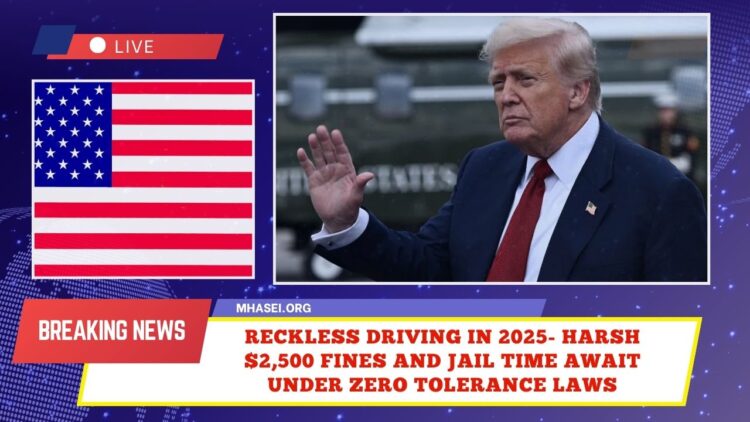Reckless driving is no longer treated as a small mistake in the United States. In 2025, zero tolerance laws mean that if you drive dangerously, you could face up to $2,500 in fines, jail time, and even loss of your license—even if it is your first offense.
Lawmakers are getting strict to prevent crashes and save lives. In this guide, we’ll explain what reckless driving is, why these laws matter, what penalties you face, and how to avoid them.
What Are Zero Tolerance Laws?
Zero tolerance laws are strict rules that treat reckless driving as a serious crime, not just a traffic ticket. These laws were created to stop dangerous driving before it causes deadly accidents.
- In the past: Many drivers got away with warnings or small fines.
- Now in 2025: Judges and police treat reckless driving like a crime that can land you in jail.
- Message to drivers: One wrong move can change your life forever.
Why Reckless Driving Laws Matter
Reckless driving is one of the top causes of deadly car crashes. According to the National Highway Traffic Safety Administration (NHTSA), thousands of people die each year due to preventable accidents.
Key reasons these laws matter:
- Saves lives by forcing drivers to think before acting.
- Protects communities from dangerous drivers.
- Reduces accidents linked to speeding, racing, or texting while driving.
What Counts as Reckless Driving?
Reckless driving is when someone drives with “willful or wanton disregard” for the safety of others. That means ignoring the rules and putting people at risk.
Common Actions That Count as Reckless Driving:
- Driving 25 mph or more over the speed limit.
- Weaving dangerously between lanes.
- Street racing or showing off stunts.
- Fleeing police when asked to stop.
- Texting or distracted driving.
- Driving when too tired to stay alert.
Even one of these actions can turn a normal traffic stop into a criminal record.
Penalties for Reckless Driving in 2025
The punishments for reckless driving in 2025 are very harsh. Below is a breakdown of penalties:
| Offense | Penalties |
|---|---|
| First Offense | Fine up to $2,500, jail up to 1 year, license suspension (30–90 days in some states) |
| Second Offense | Higher fines ($1,000–$2,500), longer jail time (up to 6 months), extended license suspension |
| Third Offense | Fine $1,500–$2,500, mandatory jail time (weeks or months), possible lifetime license revocation |
Example: In Virginia, reckless driving is a Class 1 misdemeanor with up to 12 months in jail. In California, jail can range from 30 days to 6 months if injuries occur.
Beyond the Fine: Long-Term Consequences
The punishment doesn’t stop at a fine or jail. A conviction can change your future:
- Criminal Record – Reckless driving stays on your record and can affect job applications.
- Insurance Rates – Premiums can rise by 80–100% for 3–5 years.
- License Problems – Suspensions or revocations can make travel difficult.
- Other Impacts – Rental issues, immigration problems, or difficulty getting professional licenses.
This means a single reckless mistake could cost thousands of dollars over time.
Repeat Offenders Face Harsher Penalties
If you don’t learn after your first mistake, punishments get worse:
- Second offense – Jail and fines double, suspension can last up to a year.
- Third offense – Mandatory jail, fines up to $2,500, possible lifetime license loss.
- Causing injuries or deaths – Some states (like Michigan) can charge you with a felony, leading to 5–15 years in prison.
Hiring a lawyer may help reduce charges, but zero tolerance laws leave little room for mercy.
How to Avoid Reckless Driving Charges
Here are simple ways to stay safe and avoid charges:
- Follow speed limits – Don’t go more than 25 mph over the posted limit.
- Stay focused – Keep your phone away.
- Obey police officers – Fleeing is an instant reckless driving charge.
- Don’t drive tired – Rest before long trips.
- Know your state laws – Each state has different definitions and penalties.
If you are charged, consult an experienced traffic attorney immediately.
Reckless Driving in 2025
| Feature | Details |
|---|---|
| Maximum Fine | Up to $2,500 |
| Jail Time | Up to 1 year for first offense |
| License Suspension | 30 days to lifetime ban (for repeat offenders) |
| Criminal Record | Misdemeanor or felony depending on severity |
| Insurance Impact | Premiums increase by 80–100% |
| State Variations | Strictest in Virginia, California, Michigan |
Reckless driving in 2025 is treated as a serious crime, not just a mistake. With fines up to $2,500, jail time, license suspension, and long-term impacts on jobs and insurance, one reckless act can destroy your future. These laws are meant to protect lives, not punish unfairly.
The best way to stay safe is simple—drive responsibly, avoid distractions, and respect traffic rules. One bad decision is never worth the lifelong consequences.
FAQs
Can a first-time reckless driving charge avoid jail?
It is possible, but not common in 2025. Courts may order jail, especially if your driving put others in danger.
Will reckless driving affect my insurance rates?
Yes. Insurance rates can increase by 80–100% for 3–5 years.
Can I reduce a reckless driving charge?
Sometimes a lawyer can reduce it to a smaller offense, but zero tolerance laws make this harder.




